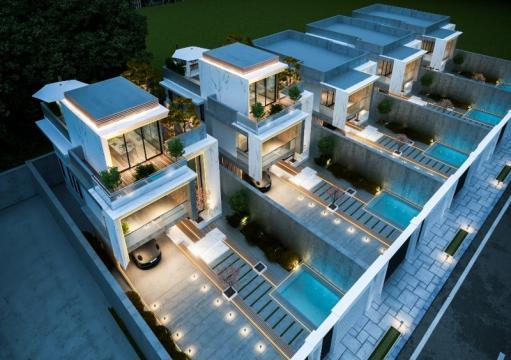Why Are Houses So Expensive In Ghana? A Guide To Housing Prices
Why Are Houses So Expensive In Ghana? A Guide To Housing Prices
- by PropHunt Admin
- On 23-06-2023
- at 11:00 AM

The soaring prices of houses in Ghana have become a matter of concern for many prospective homeowners and researchers alike. The cost of owning a house in the country has experienced a steady and significant rise over the years, making it increasingly unaffordable for a large segment of the population.
This issue has prompted a closer examination of the underlying factors contributing to the exorbitant housing prices in Ghana. Understanding why houses are so expensive in Ghana requires delving into various economic, structural, and socio-cultural factors that shape the housing market.
By exploring these elements, we can gain insights into the challenges faced by buyers and developers and identify potential avenues for addressing this pressing issue.
Why Are Houses So Expensive In Ghana?
Over the past few decades, there has been a significant shift in the average cost of a home in Ghana. The historical price growth seen in the Ghanaian housing market is a result of political, economic, and other societal changes that have combined to result in consistent price increases.
Housing policies over the years have concentrated more on the supply of more housing units. Yes, it is true that the demand for housing is far greater than the supply, which therefore calls for more houses to be supplied. But this begs the question: is supply the only problem in the housing market? The answer is definitely NO.
Now that more houses have been built, the housing deficit is soaring. There are more vacant houses in the country than before, and yet people can't afford them. There is a problem on the demand side of the market, and the government should focus attention on the people's affordability instead of supplying more when they can't afford it.
In this article, we will talk about why houses are expensive in Ghana, and that will include what you already know about housing prices in Ghana and what you don’t know about housing prices in Ghana.
What You Already Know About House Prices In Ghana
Ghana has experienced rapid population growth and urbanization in the last two decades. As more people migrate to cities in search of better economic opportunities, the demand for housing has skyrocketed. Unfortunately, the housing supply has failed to keep pace with this surge in demand, leading to a significant shortage of available homes. This supply-demand imbalance creates a competitive market where prices are driven up, making it difficult for many Ghanaians to afford a home.
What You Don’t Know About House Prices In Ghana
When you look at the average house price listed online and compare that to the local economy, you'll realize that house prices in Ghana do not reflect the economy. Consider a GHC500,000 house in Accra that you plan to finance with a 15-year fixed-interest mortgage with an interest rate of 21 percent. This mortgage, when approved, will require a monthly repayment of GHC9,153. Given this, more than 70% of people working in the public sector can’t afford this housing unit.
Once more, you can see how expensive housing is in Ghana by comparing housing prices in the country to those in the USA. For instance, if you compare a $1,000,000 house in the USA to a $1,000,000 house in Ghana, you'll see that the house in the USA is on a larger piece of land and has more structural space for additional uses. The one in Ghana, on the other hand, will only be a 5-bedroom house on a small plot of land with little structural space. Clearly, there is no value for money in the Ghanaian real estate market.
But why do we say houses are so expensively priced in Ghana? Housing costs are indeed relative. The price of a house may seem expensive to someone but look normal to another person because of income differences. Also, some industry experts are of the view that house prices are not absolute. There is a correlation between the asking price of a house and your income. So perhaps your income is too low, not the cost of the house.
That is why I stated at the outset that housing costs across the nation do not accurately represent the regional economy. The severe housing shortage in the nation is caused by the fact that what people earn daily is far below the cost of housing. Even the housing units that the government constructs and advertises as being affordable are out of reach for middle-class families.
Aside from low incomes, the majority of households find it extremely difficult to acquire homes in Ghana due to the high cost of financing, high transaction expenses, and the consistently falling Ghana Cedi.
Factors Contributing To Expensive Housing In Ghana
The high cost of houses in Ghana has become a pressing issue that affects individuals, families, and the overall development of the country. Understanding the reasons behind the exorbitant prices of houses is crucial for policymakers, economists, and citizens alike. This essay will delve into the factors contributing to the expensive housing market in Ghana and shed light on the complexities that surround this issue.
1. The cost of land and its complexities
The high cost of land directly affects the cost of housing construction and, subsequently, the selling prices of houses. Land expenses are a significant portion of the total project cost for developers, and these costs are transferred to homebuyers. The escalating land prices and complexities associated with land acquisition and registration create financial barriers that make it challenging for developers to provide affordable housing options.
Ghana has a complex land tenure system, which involves various customary, communal, and statutory land ownership arrangements. This complexity makes it challenging to acquire land for housing development. The process of identifying and verifying land ownership, negotiating with multiple stakeholders, and going through the necessary legal procedures can be lengthy and costly.
2. High cost of finance
The finance and mortgage systems in Ghana pose significant challenges to prospective homeowners. Limited access to affordable financing options, coupled with high-interest rates and stringent lending requirements, restricts the ability of many Ghanaians to obtain a mortgage. Informal lending practices often come with higher costs, further exacerbating the affordability crisis.
Developers and homebuyers in Ghana are very concerned about financing real estate. Even seasoned real estate investors must devote time to securing funding for the housing units that are still under development. Therefore, the cost of building dwellings is influenced by the interest rates banks charge on loans.
3. Higher construction costs
The construction sector and infrastructure development also play a vital role in the expensive housing market. Ghana relies heavily on imported construction materials, which are subject to fluctuating exchange rates and import duties. The cost of importing these materials adds to the overall expense of building houses. Furthermore, inadequate infrastructure in many areas necessitates additional investments from developers to provide basic amenities, further driving up costs.
4. Lower household incomes
You cannot talk of expensive housing without mentioning the low nature of income levels in Ghana. The fact is that incomes in Ghana are generally too low to afford houses. The average monthly income per person recorded in the seventh Ghana Living Standard Survey is GHC 12,000 per person. This, of course, cannot afford a GHC200,000 house in Accra.
When household incomes are low, it becomes more challenging for individuals and families to afford housing at current market prices. The cost of housing, including mortgage payments or rent, utilities, and maintenance, consumes a significant portion of a household's income. If incomes are insufficient to cover these expenses, households may struggle to access adequate and decent housing, leading to housing affordability challenges.
5. Inflation and exchange rate
Inflation has been a hot topic as of late, with many economists carefully watching the consumer price index in Ghana. The Bank of Ghana Monetary Policy Committee has increased its policy rates multiple times in the last 2-years. As a result, mortgage lenders raise their own interest rates, which has an impact on the entire housing market.
The Monetary Policy Rate (MPR) in Ghana is currently set at 13.5%. This is the rate at which the Bank of Ghana lends money to commercial banks in the country. This rate is a key tool used by the central bank to regulate the economy and influence inflation.
Will Housing Prices Go Down In Ghana?
It is expected that the IMF deal will cushion economic growth in the country by the fourth quarter of 2023, growing into 2024. In view of this, the economy is expected to stabilize and inflation to further decrease. So, by and large, housing prices are also expected to have momentum and not increase rapidly, but we shouldn't expect house prices to decrease as we so wish. Housing has a longevity attribute, and it takes longer to produce it, so an immediate positive impact on an economy will not immediately reflect on house prices.
Conclusion
Addressing the high cost of houses in Ghana requires a multi-faceted approach. Collaboration between the government, private sector, and stakeholders is necessary to implement policies that promote affordable housing, streamline land acquisition processes, and enhance access to financing. Prioritizing sustainable and inclusive housing development will not only improve living conditions but also contribute to the overall economic and social well-being of the country. By tackling these challenges, Ghana can work towards a more accessible and equitable housing market for all its citizens

 French
French




